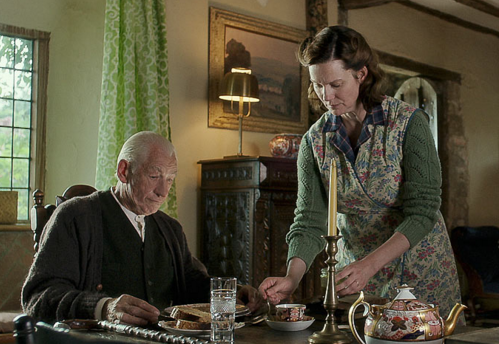“Exceptional children are often born to unremarkable parents.” Such are the abrupt ways of the near senile Sherlock Holmes (played with just the right amount of grotesquerie by Ian McKellen, who one still always envisions explaining his acting technique to Ricky Gervais in Extras). Naturally, this isn’t the first (and surely not the last) time Holmes has been depicted in his old age–Billy Wilder’s The Private Life of Sherlock Holmes, however, still remains the most consummate. But what makes Mr. Holmes a unique delineation of the archetypal detective is the fact that it stems from a novel not written by Sir Arthur Conan Doyle. Instead it is derived from Mitch Cullin’s 2005 novel, A Slight Trick of Mind.
This departure from Conan Doyle’s original voice and distinct imagery of the iconic character lends director Bill Condon’s version a life of its own, as we’re given a window into Holmes’ at his weakest. Rather than the sharp-as-a-tack man we’ve come to know through the lore of other films like Guy Ritchie’s Sherlock Holmes and Sherlock Holmes: A Game of Shadows, this is a Holmes beat down by a fading memory, particularly of a case he believes to be what led him to go into sequestered hiding for the past thirty years. At age 93, Holmes, however, still can’t give up the one thing that made him famous: his mind. Thus, he goes to Hiroshima (just two years after the end of World War II, which leaves him subject to the sight of many victims of the atomic bomb) to seek out a special cure in the form of a prickly ash plant from a supposed admirer named Tamiki Umezaki (Hiroyuki Sanada). This serves as the subplot mystery element of Jeffrey Hatcher’s (best known for adapting Stage Beauty) screenplay, as Umezaki confesses the real reason for summoning Holmes when the latter presents him with the clues he’s found to prove the contrary. That reason is his blame of Holmes for keeping his father in England after Holmes advised him to stay in the country rather than return home to his wife and children.
This accusal merely serves to compound what we’re led to believe about Holmes all along during the film: he’s cold–and his coldness has destroyed relationships; not just his own, but those of others. It’s the cross he must bear and the one that’s perhaps led to the cruel karmic fortune of literally losing his mind. And yet, the presence of his housekeeper, Mrs. Munro (Laura Linney), and her son, Roger (Milo Parker), enable him to recall–in brief moments of clarity–what led him to this point. Indeed, talking to Roger about his past helps him write his own work of “fiction” in a manner that Watson (noticeably missing from the movie) never could. Though, at times, the narrative unfolds like a stodgy thriller aimed at being solved by someone with a fifth grader’s comprehension, there can be no denying the meaning behind Holmes’ greatest regret in life: turning his back on humanity by relying solely on logic rather than intuition. And that can be a very dangerous thing indeed.






















